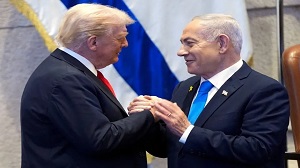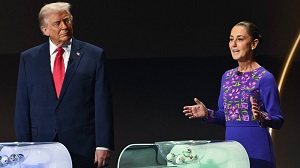It would be absurd for any political commentator to ignore the US presidential elections, in which a very substantial number of voters have already cast their ballots through early voting, before the official election day on Tuesday.
And after what we have seen in the Gaza Strip, it would be strange to remain silent in the face of the brazen "explicit" effort to displace people in Lebanon, where, so far, most of the residents of the largest Shiite cities, towns, and suburbs have been uprooted and displaced!
However, as I struggled with a "dilemma" on whether to comment on the US elections or the tragedy in Lebanon, I happened to come across an interview with American academic, expert, and political advisor Jeffrey Sachs, in which he discussed the Ukrainian crisis and its background.
One could say: "Given the importance of these two matters, isn't discussing anything else a form of evasion?" The truth is, I have never shunned away from expressing my opinion on the "Donald Trump – Kamala Harris battle" in America, nor will I ever evade the matter, nor on what has happened and continues to happen in Lebanon, and Gaza, in the future.
However, the significance of Sachs' comments (he was a witness and participant in many of the developments) is that they unpack the circumstances of the Ukraine war. Firstly, he discusses the manner in which US administrations (both Republican and Democratic) handle global crises. Secondly, he provides a factual historical overview of how the crisis began - one that has rearranged the strategic priorities of most European countries and reshaped many alliances and predictive readings of what might happen in the world.
In the interview, Sachs says that the crisis is not an attack by (Vladimir) Putin on Ukraine like we are constantly being told. Rather, it erupted in February 1990, when the US Secretary of State at the time, James Baker, promised that NATO would not expand if Moscow agreed to the reunification of Germany, a promise that Soviet leader Mikhail Gorbachev accepted.
However, Washington reneged on its promise when President Bill Clinton signed an agreement to expand NATO, in 1994, as far as Ukraine. Indeed, Poland, Hungary, and the Czech Republic joined NATO in 1999. Moscow had ignored this step, but it began to become alarmed following the NATO-US campaign in Serbia that same year.
Nevertheless, Moscow remained silent and "swallowed" the issue when Putin took power in Russia. In fact, Putin initially considered European orientations, even contemplating joining NATO for a while.
Then, after 9/11 and the War in Afghanistan that followed, Washington unilaterally withdrew from the Anti-Ballistic Missile (ABM) Treaty in 2002 and deployed missile systems in Eastern Europe "minutes away from Moscow" - which Russia considered a direct threat to its national security - although Moscow had supported Washington’s "War on Terror."
In 2003, the US invaded Iraq for entirely fabricated reasons, according to Sachs. In 2004-2005, it pushed "regime change in Ukraine" and supported Viktor Yushchenko’s rise to power. However, in 2009, Viktor Yanukovych, with Moscow’s support, won the elections and took office championing "Ukrainian neutrality" in 2010. This cooled the temperature temporarily, especially since polls showed that Ukrainians did not support joining NATO, Sachs claimed in the interview.
However, Washington proceeded to work on toppling Yanukovych and pursue regime -change, joining the effort to push him out of powers on February 22, 2014. Thus, it imposed the expansion of the alliance despite Putin's objections and attempts to remind Washington of its promises. By the way, ten years earlier, in 2004, Washington had added seven other Eastern European countries to NATO.
Sachs reiterates that Washington has always been keen on expanding NATO to Russia's borders and objects to any settlement on the matter. He then lists subsequent developments that "destroyed what remained Washington's partners’ trust," as he put it.
In 2018, the US withdrew from the nuclear agreement it had concluded with Iran, and in 2019, it withdrew from the Intermediate-Range Nuclear Forces (INF) Treaty. "Reckless foreign policy" continued to be pursued, when Putin proposed a draft security agreement to Washington in December 2021 with the aim of ending NATO expansion. Sachs says he personally contacted the White House and urged them to avoid war and engage in negotiations, but "No, there will be no war," was the response he received. His interlocutor repeated the announcement that there would be no NATO expansion, but that is exactly what happened.
"You have no right to plant military bases wherever you want... and expect peace. We have to be reasonable and logical, and we (the Americans) stood in 1823 against the expansion of European powers in the American continent through the Monroe Doctrine."
He concludes by saying that "the narrative around the Ukraine crisis is false... and Putin is not another Hitler... likewise, we should stop what we are doing with regard to China and Taiwan."
Finally, to get back to the US elections and the tragedies of Lebanon and Gaza, I believe that Jeffrey Sachs’s remarks provide crucial insights about certain highly placed interests willing to ruin anything, demonize anyone, obliterate any issue, erase any country, and invent any delusion.
The US elections and the tragedies of Lebanon and Gaza are unfolding today in a world teetering between "unipolarity" that openly applies double standards, disregards international institutions, ignores the rights of peoples and dismisses pluralism of identities and nationalities.
On the other hand, resentful forces are rising. They no longer see themselves as fated to defeat and surrender at the hands of an aging West that is failing to rejuvenate itself and opposes allowing others to come in and reinvigorate its societies.
Latest News
-
 Foreign Minister, Qatari prime minister discuss bilateral ties, Gaza developments
Foreign Minister, Qatari prime minister discuss bilateral ties, Gaza developments
-
 Jordan beats Egypt to reach 9 points at top of group C in Arab Cup
Jordan beats Egypt to reach 9 points at top of group C in Arab Cup
-
 Netanyahu to Meet Trump on December 29
Netanyahu to Meet Trump on December 29
-
 Hamas says no Gaza truce second phase while Israel 'continues violations'
Hamas says no Gaza truce second phase while Israel 'continues violations'
-
 Trump threatens Mexico with fresh tariffs over water dispute
Trump threatens Mexico with fresh tariffs over water dispute